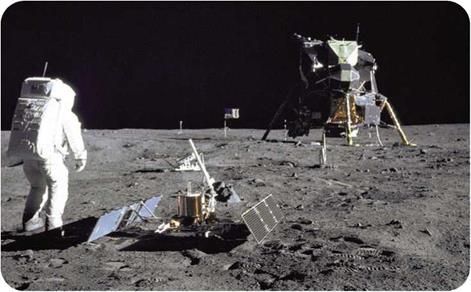Weight
If an object with a mass of 132 pounds (60 kilograms) is weighed, the scales show a weight of 132 pounds (60 kilograms). If the same object is taken to the Moon and weighed there, it weighs only
 О Gravity is weaker on the Moon than on Earth because the Moon is smaller and has less mass. Astronauts on Apollo missions set up scientific experiments on the Moon to find out about its force of gravity and other aspects of its environment.
О Gravity is weaker on the Moon than on Earth because the Moon is smaller and has less mass. Astronauts on Apollo missions set up scientific experiments on the Moon to find out about its force of gravity and other aspects of its environment.
22 pounds (10 kilograms), because the Moon’s gravity is only one-sixth the strength of Earth’s gravity. However, the object’s mass has not changed. It is still 132 pounds (60 kilograms).
The pound mass and the pound of weight, or pound-force, are therefore different. The pound mass never changes, but the weight of the pound mass depends on the strength of gravity acting upon it. In the metric system, the unit of mass is the kilogram, and the unit of force is the newton. Gravity acts on a mass of 1 kilogram with a force of 9.8 newtons. So, a 1-kilogram mass actually weighs 9.8 newtons. It is important to know the weight of an aircraft or rocket because it shows how much lift it must generate to take off.
WEIGHTLESSNESS
The strength of Earth’s gravity weakens with distance. The farther that something is from the center of Earth, the weaker the force of gravity it experiences, and so it weighs less. This means that airline passengers and astronauts in space weigh less the higher they go.
This does not explain why astronauts are able to float about in space. Astronauts are weightless not because the force of gravity has fallen to zero where they are. In fact, the force of gravity acting on astronauts in Earth orbit is just a fraction less than the force of gravity at Earth’s surface. Orbiting astronauts float about because they are in a state of free fall, like skydivers.
_______________________________________ )










